What is Temporary Residence Canada? Steps and Criteria!
Your Quick 30-Second Answer to Temporary Residence Canada!
Temporary Residence in Canada encompasses visitors, students, and temporary foreign workers. Visitors typically stay up to six months, with extensions possible under certain conditions. Over 1 million study permits and over 1.5 million work permits were processed in 2023, reflecting the program's growth. For those with criminal records, a Temporary Resident Permit (TRP) offers entry for up to three years, depending on the individual case. This permit is essential for addressing criminal inadmissibility. Temporary residents must adhere to specific conditions; for instance, they cannot work or study without the proper permits. International students may work part-time, and temporary foreign workers must follow their work permit restrictions. In cases of visa expiry, individuals can seek extensions or change their status under Implied Status but must leave Canada if they become inadmissible or reach their authorized stay's end.
For an in-depth overview, please see the "Table of Contents" below.
Discover Your Path to Temporary Residence Canada!
Welcome to this easy-to-follow guide on temporary residence Canada.
Table of Content
TABLE OF CONTENT
Basic Introduction
1. Overview: Temporary Residence
2. What is Temporary Residence?
3. What is a Canadian Visa?
4. Who can be Temporary Resident?
Visitors Class
5. Who is a Visitor in Canada?
6. Who can become a Visitor?
7. Types of Visitor Visas
Students Class
8. Who is a Student in Canada
9. Who can become a Student?
10. Types of Student Programs
Workers Class
11. Who is a Worker?
12. Who can become a Worker?
13. Types of Workers Programs
TRP Holders
14. Who is a TRP Holder?
15. Who can become a (TRP) Holder?
16. Types of the TRP Programs
Additional Information
17. Temporary vs. Permanent Resident
18. Summary: To Wrap Up!
Additional Resources
19. Common Questions (FAQs)
20. Useful Links & Resources
1. Basic Overview: Temporary Residence in Canada
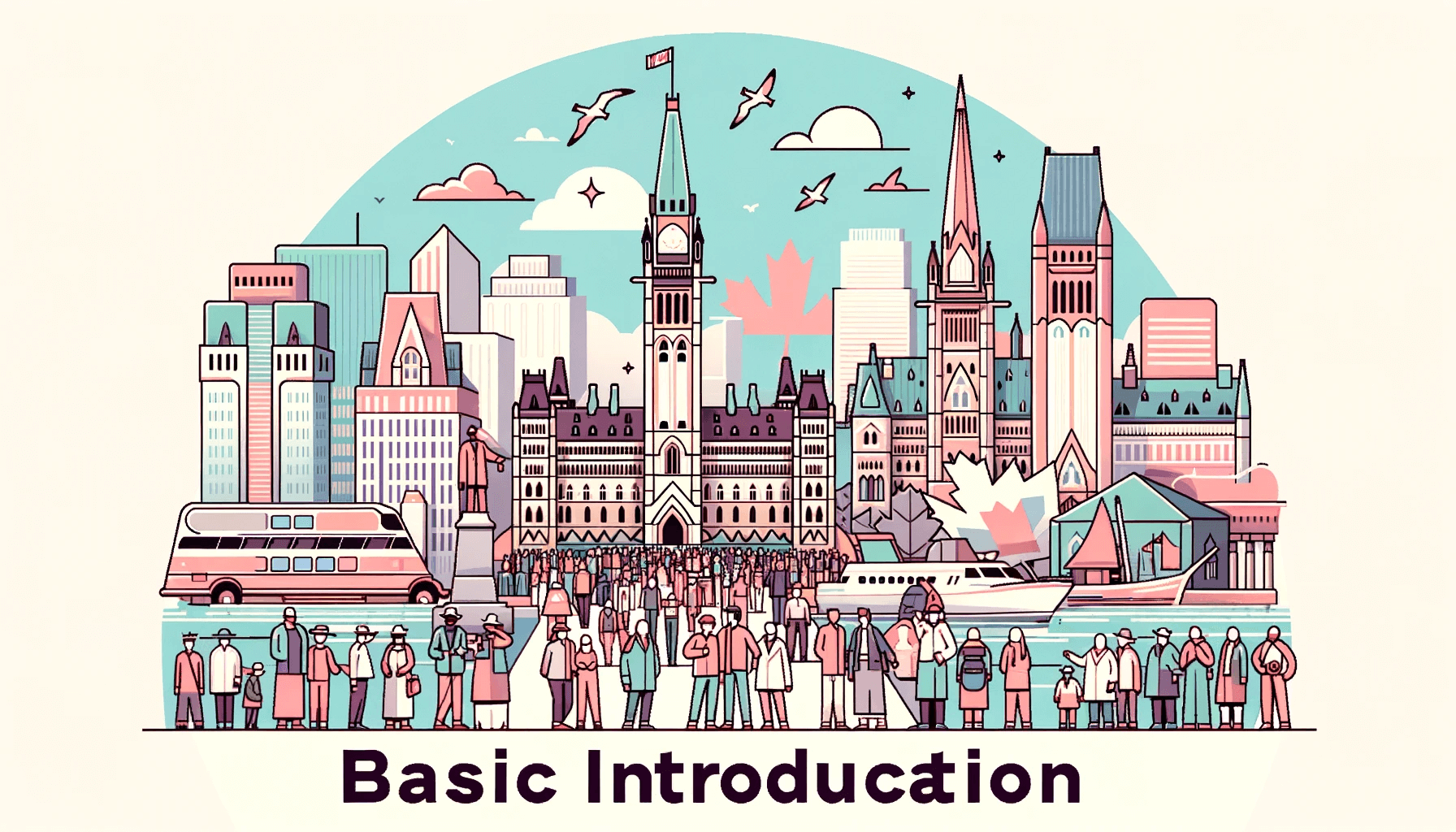
Temporary Residence in Canada: If you want to stay in Canada for a short while, maybe for vacation, school, work, or to visit family, you can get what's called a "temporary residence." in Canada. It's like a special permission that lets you be in Canada for a set time. But, it's different from those who live there all the time (permanent residents) because you can't stay forever and you have to follow some rules based on why you're there.
If you're thinking about going to Canada for a short visit, it's really important to know how to get this temporary permission. This immigration information resource will help you understand how to obtain it, what you need, and what's good about having one. This page is put together to help you understand about staying in Canada for a short time. Whether you're thinking of going there for a trip, school, or job, our guide has all the info you need to make things easier for you.
2. What is Temporary Residence in Canada?
If you're from outside Canada and wish to stay here for a short time, you'll need something called "temporary residence." This is like a special pass or permission.
How to Study in Canada?: If you come to Canada to study, you'll get a "Student Visa". This lets you attend school or college here.
How to Work in Canada? If you're here to work for a bit, you'll need a "Work Permit". This means you have the OK to have a job in Canada.
How to Visit Canada? Just here to travel and see the sights? Then you'll likely have a "Tourist Visa".
Each of these temporary residence Canada passes has its own rules, like how long you can stay and what you're allowed to do while you're here.
Temporary Residence in Canada refers to individuals who are allowed to enter and stay in Canada for a limited period under specific conditions. This includes visitors, students, and temporary foreign workers. The Temporary Resident Visa (TRV) is required for certain visitors, while others may need a study or work permit. The duration of stay is typically up to six months for visitors, with possible extensions under certain conditions.
Study Permits are issued to international students and have witnessed a significant increase in applications, with over 1,025,000 applications finalized in 2023. Similarly, Work Permits are essential for temporary foreign workers, and their processing has also seen a substantial rise.
For those with criminal records, a Temporary Resident Permit (TRP) can be granted, allowing entry into Canada for a period ranging from one day to three years. The TRP can be for single or multiple entries, depending on individual circumstances. In cases of criminal inadmissibility, options like Criminal Rehabilitation or Deemed Rehabilitation might be explored, based on the nature and timing of the offense.
Temporary residents are subject to restrictions; for instance, they cannot work or study in Canada unless they meet specific criteria or have the necessary permits. International students can generally work part-time, and temporary foreign workers are bound by the conditions of their work permits.
In case of visa expiry, individuals can apply for an extension or change of status to maintain their legal status under Implied Status. However, if they become inadmissible or reach the end of their authorized stay, they may need to leave Canada or extend their stay.
In summary, Temporary Residence in Canada in 2024 encompasses various categories, each with specific application processes, conditions, and restrictions. It's crucial for individuals to understand their category, comply with the conditions, and maintain legal status during their stay in Canada.
3. What is a Canadian Visa?
A Canadian visa is like a special sticker or stamp they put in your passport. It's Canada's way of saying, "Hey, you're good to come in!" Before you get this stamp, Canada checks to make sure you fit the reasons you want to visit. Just like there are different tickets for a concert, movie, or theme park, Canada has different visas for reasons like vacationing, studying, or working. Each type of visa has its own rules and time limits. So, if you need a visa, it's super important to pick the right one for your trip.
Important Points About the Canadian Visa:
1. That special visa sticker in your passport? It's mainly to get you into Canada and doesn't do anything else.
2. Make sure you get into Canada while your visa is still valid – before it runs out!
3. Just because you have a visa doesn't mean you're 100% in. When you land in Canada, they'll double-check to see if you still match what the visa asks for.
4. At the Canadian airport or border, you'll have a quick talk with the border officers. They'll make sure you're still good to enter, and check that you have plans to head home before your visa ends.
Are You from a Visa-Exempt Country?
- some countries don't need a visa to enter Canada.
- If flying in, you might need an Electronic Travel Authorization (eTA) instead.
- Coming by land or sea? You won’t need the eTA.
- Think you might be exempt?
It's important to note that having a visa does not guarantee entry into Canada; it simply allows you to travel to a Canadian port of entry (like an airport or border crossing) where an immigration officer will decide if you can enter.
4. Who can go to Canada as a Temporary Resident?
Temporary residence Canada programs are set up to cater to 3 main groups of people:
1. Tourists and Visitors: These are folks who come to Canada for vacations, to see family and friends, or to look into business chances. To learn more about visiting Canada, visit following links:
2. Students: People from other countries coming to study in approved Canadian schools. They need a special study pass unless their courses are less than half a year long.
3. Short-term Workers: People who come to work in Canada for a short while. Most of the time, they need a permit to work, but there are a few job types that don't need one.
If you're thinking about staying in Canada for a short time, you need to tick certain boxes:
- Travel Papers: Most often, this is a passport.
- Health Check: Some might need a doctor's checkup.
- No Bad History: If you've been in trouble with the law, Canada might not let you in. Some folks can show they've changed or apply to be seen as "reformed" to get past this.
- Enough Money: Prove you can pay for your trip and get back home.
- Promise to Leave: You need to convince the officials you'll go home after your visit.
- Safe Record: They'll check if you've done anything in the past or have ties that might be a security worry.
- Travel Pass (TRV): People from some countries need this. Others, who are allowed short trips without a visa, might still need an eTA, especially if they're flying in.
Some more points to keep in mind:
- Identity Checks: Canada might ask for fingerprints and a picture to know who you are.
- Extra Stuff: Depending on your reason to visit, like an acceptance letter for students or a job letter for workers.
- Entry Issues: If Canada thinks you're not okay to come in because of safety, health, or past troubles, you might not get in unless you sort out these issues.
Lastly, if you're thinking of coming to Canada for a short while, it's smart to check Canada's official immigration website or chat with an expert in immigration. They'll give you the latest details and advice that's right for you.
5. Who is a Visitor in Canada?
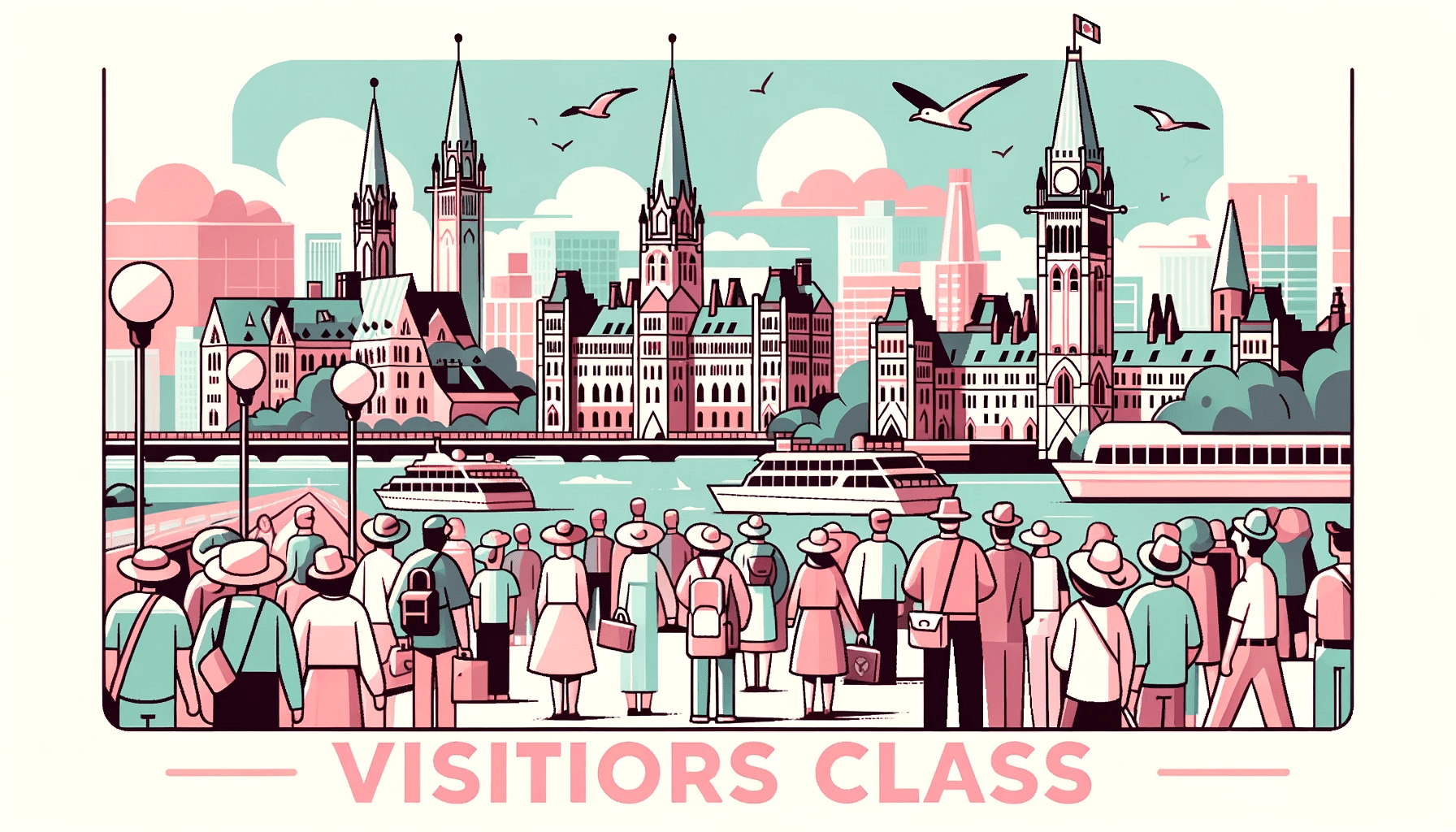
In Canada, when we talk about a "visitor," we're referring to someone who stays for a limited time. Let's dive deeper into this, keeping the term "temporary residence Canada" in mind:
Purpose of Their Stay: Often, these visitors arrive in Canada to experience the country's unique attractions, reconnect with family or friends, or engage in business discussions.
Temporary Stay: Distinctly different from permanent residents, visitors to Canada are on a temporary residence. Canada is not their endgame home; they're just here for a short stint.
Understanding Work & Education Guidelines in Canada:
- Work: Visitors can't just take a job in Canada. If they want to work, they need a special document called a "Work Permit".
- Study: Similarly, if a visitor wants to attend a school, college, or university here, they'll need a "Study Permit".
Remember, these rules are in place to make sure everyone follows the proper process and respects the country's laws.
6. Who can become a Visitor?
To be considered for temporary residence in Canada as a visitor, individuals must meet certain criteria. A visitor typically refers to a non-Canadian citizen or a non-permanent resident coming to Canada for purposes such as tourism, business, or reconnecting with family. While many individuals from foreign countries can apply for this status, obtaining temporary residence Canada in the form of a visitor status (often referred to as a "visitor visa" or "temporary resident visa") requires adherence to the following conditions:
1. Intention to Return: Applicants must provide evidence supporting their commitment to depart from Canada upon the conclusion of their visit.
2. Financial Stability: It is imperative for applicants to prove they possess adequate funds to cover their expenses during their stay in Canada and for their return journey.
3. Criminal History Verification: Those with certain criminal convictions might be denied entry into Canada unless they've secured an official pardon or undergone rehabilitation.
4. Health Considerations: Based on circumstances, individuals may be required to undergo a medical assessment to confirm they won't present a health risk to the Canadian public.
5. Security Concerns: Authorities will carry out thorough checks to ascertain that applicants do not pose any potential security risk to Canada.
6. Additional Entry Requirements: Depending on an individual's nationality, acquiring either a visitor visa or an Electronic Travel Authorization (eTA) might be necessary to enter Canada as a visitor.
Remember, your nationality may dictate if a visa or an Electronic Travel Authorization (eTA) is a prerequisite for temporary residence Canada.
7. What are Different Types of Visitor Visas?
Canada offers several types of Visitor visas. Here's a simplified breakdown:
1. Single Entry Visa: This allows you to come to Canada only once. If you leave and want to come back, you'll need to apply for a new visa.
2. Multiple Entry Visa: With this, you can travel in and out of Canada several times for up to a decade. However, each visit should not exceed 6 months.
3. eTA (Electronic Travel Authorization): This isn't a visa. Instead, it's a special permit for those who don't need a visa to enter Canada, but they are flying in. It's good for 5 years and, like the Multiple Entry Visa, each visit should be no longer than 6 months.
4. No Visa Requirement: Some individuals from certain countries can enter Canada without a visa, thanks to agreements between their country and Canada. However, if they're arriving by air, they might need an eTA.
5. Transit Visa: Think of a transit visa like a special pass that tells the people at the airport, "I'm just walking through to catch my next flight!"
6. Super Visa: This special visa is for the parents and grandparents of people living in Canada. It permits them to stay in Canada for up to 2 years at a time and is good for multiple visits over a 10-year span.
It's crucial to understand that having a visa or an eTA does not guarantee entry into Canada. The Canadian Border Services Agency (CBSA) officer you meet when you arrive will have the final say on your entry and how long you can stay. Moreover, the details we've discussed might undergo changes, and each visa type can have specific conditions or exceptions. It's always wise to check the most recent official information or seek advice from legal experts on temporary residence Canada.
8. Who is a Student in Canada?
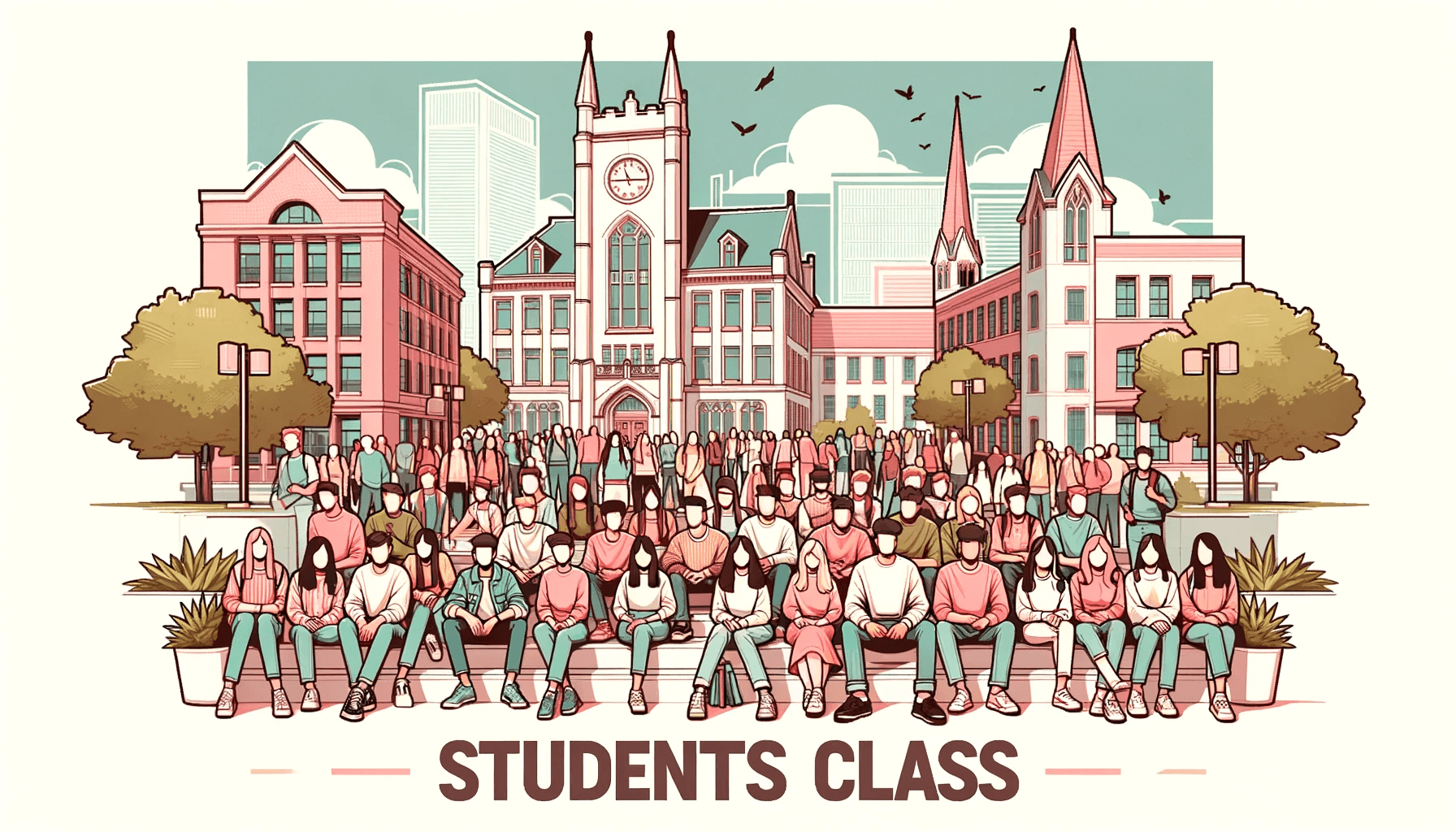
In simpler terms, when we talk about a student in Canada from another country, we're referring to someone who has secured a "Study Permit". This permit, in line with the Immigration and Refugee Protection Act (IRPA) and the Immigration and Refugee Protection Regulations (IRPR), is an official approval granted by Canada's immigration authorities. It permits the holder to pursue education in Canada's schools, colleges, or universities for a set duration. Therefore, possessing a Canadian study permit is synonymous with having the authority for temporary residence Canada as a student. So, when you come across someone with this permit, know that they have been formally granted the privilege of temporary residence in Canada to study.
9. Who can become a Student?
Anyone who fulfills the following criteria can apply to become a student in Canada:
Eligibility for a Canadian Student for Temporary Residence Canada:
1. Official Invitation: To begin, the individual should possess a genuine acceptance letter from a Designated Learning Institution (DLI) in Canada.
2. Financial Readiness: It's vital that the prospective student has adequate funds to cover:
- Their tuition fees,
- Living expenses not just for themselves but also for any family members coming with them, and
- Round-trip transportation costs for both themselves and accompanying family members.
3. Clean Legal Background: Some might need to present a police certificate to show they have no criminal history. If they do have past offenses, additional documents and perhaps rehabilitation measures might be required to be considered fit for entry.
4. Medical Clearance: Depending on various factors, certain students may have to undergo a health examination to ensure they're medically fit.
5. Guaranteed Departure: An essential criterion is the commitment to depart from Canada once their studies are over. They need to convince the immigration officer of this intention.
6. Adherence to Rules: Last but not least, to maintain their status for temporary residence Canada as a student, they need to stick to all the conditions of their study permit. This includes refraining from any unauthorized work or studies during their stay.
In short, while temporary residence Canada welcomes international students, it's essential for them to meet the necessary criteria to ensure a smooth and legitimate educational journey. Click here to learn How to apply for a study permit.
10. Types of Student Visa Programs
When talking about "student visa programs" in Canada, we mostly refer to the "Study Permit." But, there are some variations and specific programs related to studying. Here's a clearer understanding of the different student visa programs for temporary residence Canada:
Canadian Student Visa Programs explained:
1. Regular Study Permit: When most people think about studying in Canada, they're likely referring to this permit. It allows foreign nationals to attend recognized post-secondary institutions or high schools in Canada.
2. No Study Permit (Short-Term Studies): If you're looking to engage in short courses or programs that last up to six months, you generally won't need a study permit. However, some opt to obtain one as a precaution, allowing flexibility if they wish to extend their stay, change courses, or pursue further studies.
3. Post-Graduation Work Permit Program (PGWP): While this doesn't directly cater to students, it's a significant option for those who've wrapped up their studies. Graduates from certain Canadian institutions might qualify for this permit, which lets them work in Canada. The acquired work experience could be a stepping stone for those aiming for permanent residence in Canada in the future.
4. Co-op or Internship Programs: Specifically designed for students whose academic programs require work experience, this allows them to work in their field of study as part of their curriculum.
Remember, while these programs provide a fantastic opportunity for international students and graduates in Canada, it's crucial to stay updated. Regulations and guidelines can evolve. Always consult the official Canadian government's immigration website or engage with an immigration expert to ensure you have the most current information on temporary residence Canada if you're planning on joining or continuing your education in Canada.
11. Who is a Worker in Canada?
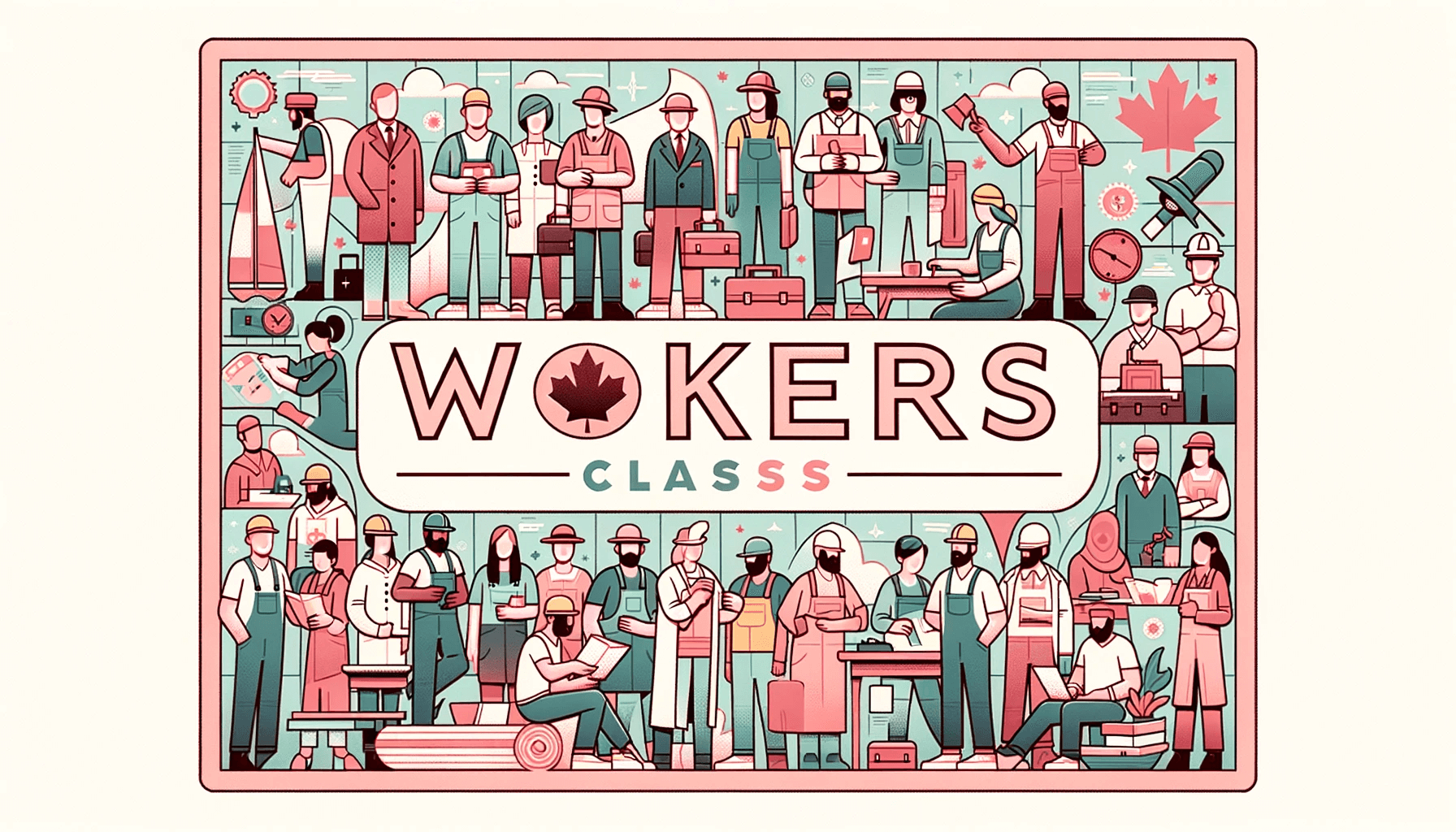
In the context of Canadian immigration, when we say "Temporary Foreign Worker", we're referring to someone from another country who has been granted permission to work in Canada. This permission is usually in the form of a work permit. Issued by the Canadian immigration authorities, this permit outlines the length of time they can work in Canada and any specific conditions tied to their employment.
In short, holding this work permit ensures they have the official nod to be employed in Canada for a certain duration and under certain terms.
In the context of Canadian immigration, when we say temporary foreign worker, we're referring to someone from another country who has been granted permission to work in Canada. This permission is usually in the form of a work permit. Issued by the Canadian immigration authorities, this permit outlines the length of time they can work in Canada and any specific conditions tied to their employment.
In short, holding this work permit ensures they have the official nod to be employed in Canada for a certain duration and under certain terms.
12. Who can become a Worker?
Let's simplify this, ensuring clarity and understanding for those of you wishing to gain temporary residence Canada as a worker:
Eligibility to Work under Temporary Residence Canada:
1. Job Offer: One of the primary requirements is usually a legitimate job offer from an employer in Canada. However, there are certain work permits that might not mandate this.
2. Labor Market Assessment: Not all jobs will require this, but some employers must first get what's known as a Labor Market Impact Assessment (LMIA) from Employment and Social Development Canada (ESDC). This process ensures that there is indeed a genuine need for a foreign worker because no suitable Canadian worker is available for that specific role.
3. Clean Legal Background: Just like with the student visa, foreign nationals looking to work in Canada might be asked to present a police certificate, verifying they have no criminal history.
4. Medical Evaluation: Depending on the nature of the job, especially if it's in sectors like healthcare, a health check or medical exam might be a prerequisite.
5. Adherence to Work Permit Category Rules: Canada has various work permit categories, each with its unique set of conditions. Prospective workers must meet the specific requirements of the category they're applying under.
If you're a foreign national considering employment in Canada, it's crucial to ensure you meet these requirements. And, as always, because immigration policies can change, it's advisable to consult the official Canadian immigration website or speak to an expert for the latest information.
13. Types of Workers Programs
For those wishing for temporary residence Canada as a worker or even more permanent avenues, Canada offers several worker programs and categories under its immigration system. Here's a breakdown:
Canadian Worker Programs & Categories:
1. Temporary Foreign Worker Program (TFWP): Aimed at employers, this program allows them to hire workers from abroad to address labor and skill gaps for a temporary period. Most of the time, employers need to get an LMIA.
2. International Mobility Program (IMP): This offers employers the chance to hire temporary workers without the need for an LMIA. The hiring is either due to existing international agreements or because bringing in such workers significantly benefits Canada.
3. Express Entry: While not a direct work program, this system evaluates skilled workers on several criteria like their job experience, education, and age. Those with high scores may be invited to become permanent residents.
4. Provincial Nominee Program (PNP): Individual provinces can invite or "nominate" people to immigrate based on the job needs in their region. This often links to a person's job or job offer in that province.
5. Post-Graduation Work Permit (PGWP): As earlier discussed, it lets graduates from Canadian institutions get work experience in the country.
6. International Experience Canada (IEC) Initiative: This includes:
- Working Holiday: Allows young people from participating countries to work anywhere in Canada.
- Young Professionals: Enables them to gain professional work experience with a pre-arranged job.
- International Co-op Internship: Designed for students to gain targeted experience in their field of study.
7. Live-in Caregiver Program (LCP): Specifically for those qualified to provide in-home care, be it for children, the elderly, or persons with disabilities.
8. Agricultural Workers: Addressing the seasonal needs of the agricultural sector, this provision is for workers who cater to farming and related activities.
This list is an overview of paths available for temporary residence Canada. Each program or category can have its sub-categories and distinct eligibility criteria. For a thorough understanding and to determine the best fit, it's advisable to delve deeper into each program's specifics or consult a professional in Canadian immigration.
14. Who is a TRP Holder?
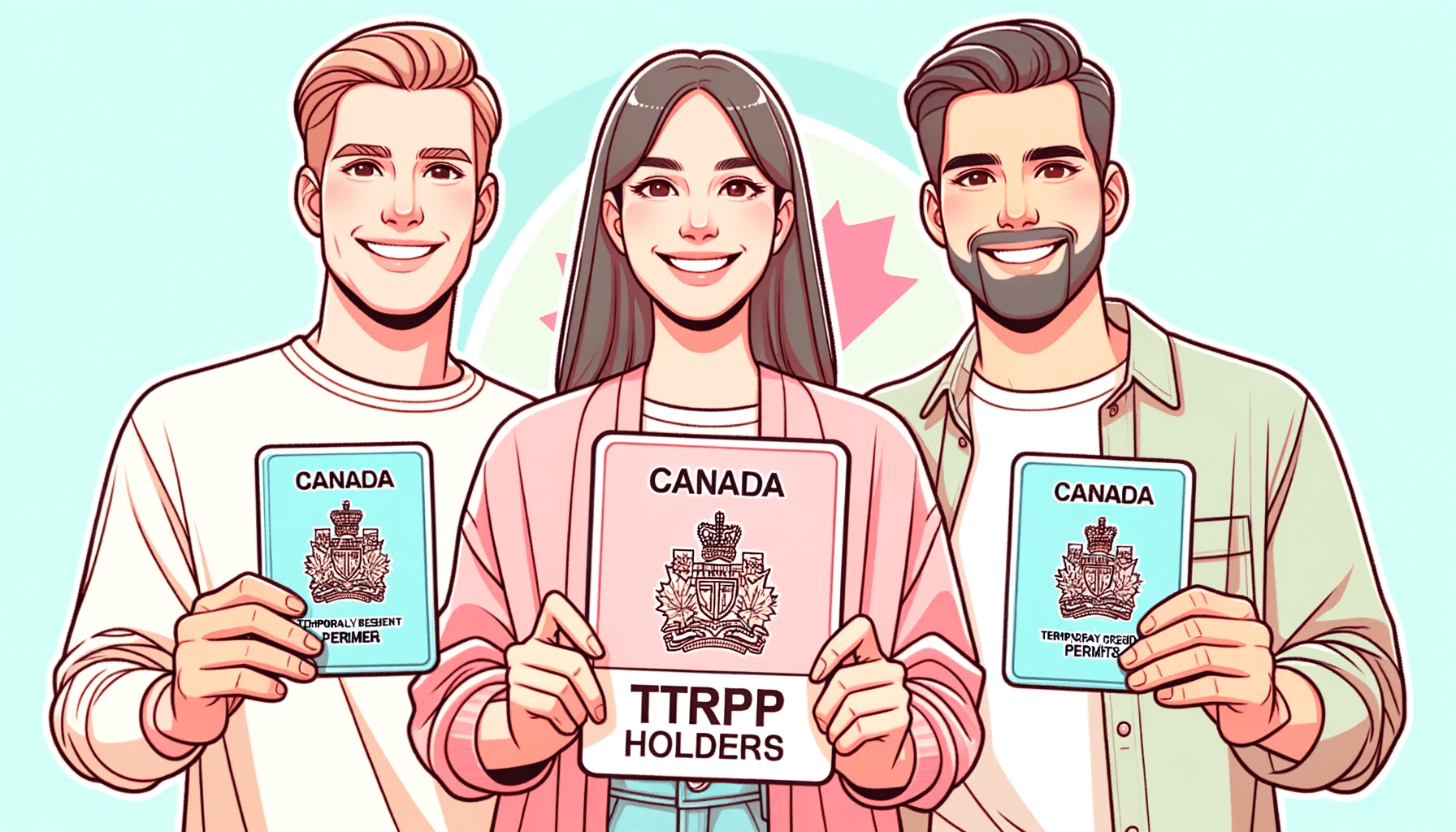
A person from another country, who might usually be unable to reside in Canada due to specific issues or not meeting the standard requirements, can sometimes receive a unique permission known as a TRP (Temporary Resident Permit). This permit essentially acts as a "temporary exception" granted by Canadian authorities.
Holders of the TRP have been given special clearance to be in Canada, bypassing the usual prerequisites for entry or stay. Such exceptions are often granted during emergencies, for humanitarian purposes, or for individuals who face barriers to entry but have a compelling reason to be in Canada. The length of their stay in Canada is determined by the terms set in their TRP. It's essential to understand that this permit is conditional and its duration is strictly based on the situation and the reasons behind its issuance and therefore its just temporary residence Canada. Also see:
- Temporary Resident Permit (TRP) or Rehabilitation
- TRP for Driving under Influence (DUI)
- Canada Application for Criminal Rehabilitation
15. Who can become a (TRP) Holder?
A foreign individual can secure a Temporary Resident Permit (TRP) under specific conditions:
1. Issues with Admissibility: If someone is deemed ineligible to enter or stay in Canada due to reasons like health concerns, a past criminal record, or providing inaccurate information (misrepresentation), they could still be considered for a TRP. Instead of outright denial of entry or residence, an official from the immigration or border services might choose to provide this special permit for a set duration.
2. Compelling Circumstances: If the person has a strong and valid reason that makes their presence in Canada crucial, and this reason surpasses any potential health or safety concerns to Canadians, they might be granted a TRP. For example, if someone has a unique skill set that's essential for a job in Canada, this could act in their favor.
3. Limited Stay: It's important for the person to demonstrate that their intention to stay in Canada is genuinely temporary and they plan to leave once their permit expires.
It's important to note that simply being ineligible doesn't automatically qualify someone for a TRP. The decision lies with the immigration officials, and they base it on the particular details and conditions of each case. The permit isn't guaranteed; it's granted on a case-by-case basis, taking into consideration the individual's specific circumstances.
16. Types of the TRPs:
For those seeking temporary residence Canada, the Temporary Resident Permit (TRP) offers a possible solution for individuals who might not usually qualify to either enter or stay in the country. Here's a more straightforward breakdown:
TRP Explained:
1. TRP for Entry: Some individuals might face barriers to entering Canada due to reasons like a past criminal record, specific health issues, or other reasons laid out in the Immigration and Refugee Protection Act (IRPA). Even with these obstacles, if they can showcase a strong and valid reason to be in Canada, they might be granted a TRP to facilitate their entry.
2. TRP for Remaining in Canada: Another category of the TRP is for those who are already on Canadian soil. This could be students, workers, or tourists who, for some reason, have lost their status or have become ineligible to stay. An example would be someone who overstayed their visa duration. If they present a solid justification for their extended stay, they might be provided with a TRP to validate their ongoing residence.
It's important to note that both categories of TRPs are issued based on the discretion of immigration officials. Each application is assessed based on its unique circumstances. Though TRPs provide a temporary fix for ineligibility issues, they aren't a long-term solution. For continued stays or repeated visits to Canada, one must address and rectify the fundamental reasons causing their inadmissibility.
17. Temporary vs. Permanent Residence in Canada
Understanding the difference between being a temporary residence Canada and permanent resident in Canada is crucial. Here's a simplified breakdown:
1. Stay Duration:
- Temporary Residents: They have a limited time in Canada and must depart once their authorized duration concludes.
- Permanent Residents: They can reside in Canada without any fixed end date.
2. Work and Education:
- Temporary Residents: They require distinct permits to either work or pursue education in Canada.
- Permanent Residents: They're free to work or study anywhere within Canada without needing specific permits.
3. Utilizing Services:
- Temporary Residents: Their access to certain government services, whether social or public, might be restricted, potentially leading to additional costs.
- Permanent Residents: They can avail of the majority of social and public services, often either free or at a reduced cost.
4. Legal Protection:
- Temporary Residents: While Canadian laws protect them, they might not enjoy all the rights that permanent residents and citizens are entitled to.
- Permanent Residents: They are safeguarded under the Canadian Charter of Rights and Freedoms and other national laws.
5. Re-entry into Canada:
- Temporary Residents: Based on their country of origin, they might need a visa or another entry document to come back to Canada.
- Permanent Residents: Possessing a valid Permanent Resident (PR) card and adhering to other entry norms, they can return to Canada without requiring a visa.
6. Journey to Citizenship:
- Temporary Residents: They must first transition to a permanent residency status. Post this, they can contemplate acquiring citizenship.
- Permanent Residents: After residing in Canada for 3 of the previous 5 years, they can seek Canadian citizenship, provided they satisfy the other requirements.
In short, whether you are a temporary or permanent resident in Canada will dictate your rights and duties within the country. Gaining clarity on these differences is vital for a seamless and compliant experience in Canada.
18. Summary: To Wrap Up Temporary Residence Canada!
The Canadian immigration framework provides several avenues for international individuals wishing to temporarily reside in the country. Each pathway is meticulously crafted to cater to various intentions, from leisure travel to work opportunities:
- Visitors can come to Canada for tourism, family visits, or business activities.
- Students have the opportunity to pursue their education in Canadian institutions. With a valid study permit, they can benefit from Canada's world-class education system.
- Workers can contribute to the Canadian labor market. With a valid work permit, they can either fill gaps in the labor market or bring specialized skills.
- There are also provisions for individuals who might face inadmissibility issues yet have compelling reasons to either enter or remain in the country, through the Temporary Resident Permit (TRP). The TRP can be used for entry or to legitimize one's stay within Canada if they have lost their status.
All these temporary statuses have specific durations and conditions attached. Temporary residents must comply with the terms of their stay and either renew their status or transition to a different status (like permanent residency) or leave the country once their authorization expires.
While temporary residence Canada offers a chance to experience Canada, those looking to make Canada their permanent home might consider pathways like Express Entry, Provincial Nominee Programs, or family sponsorships to gain permanent resident status.
Here's a simplified breakdown:
1. Visitor Class:
- Who's it for? Tourists, business travelers, and family members visiting Canadians.
- What's special? Different visa options like single or multiple entries. Special visas for elderly relatives are available too.
2. Student Class:
- Who's it for? Foreign students wanting to study at Canadian schools.
- Perks? Opportunities for employment after graduation.
3. Workers Class:
- Who's it for? Temporary specialists from various fields.
- Programs Include: The Temporary Foreign Worker Program and the Global Skills Strategy.
4. Temporary Residence Canada Permit (TRP) Holders:
- Who's it for? Individuals with special circumstances who might not meet regular criteria but can still come or stay in Canada.
Navigating the complexities of temporary residence requires a good understanding of eligibility conditions and compliance requirements. When in doubt, seeking guidance from immigration consultants or legal experts can be invaluable.
19. Frequently Asked Questions (FAQs)
Q1: What is temporary residence in Canada?
Q1: What is temporary residence in Canada?
A: Temporary residence in Canada refers to staying in the country for a limited period of time. This can include work permits, study permits, and visitor visas.
Q2: What is temporary residence status in Canada and how can I obtain it?
Q2: What is temporary residence status in Canada and how can I obtain it?
A: Temporary residence status in Canada allows you to stay in Canada for a limited time, usually for work, study, or tourism. To obtain temporary residence Canada status, you need to apply for a permit under the appropriate program. Depending on the program, you may need to meet certain eligibility requirements, such as having a job offer or being accepted into a Canadian educational institution.
Q3: What does it mean to be a temporary resident permit holder in Canada?
Q3: What does it mean to be a temporary resident permit holder in Canada?
A: Being a temporary resident permit holder in Canada means that you have been granted permission to stay in Canada for a limited time, despite being inadmissible under Canadian immigration law. This may be due to a compelling reason, such as humanitarian or compassionate grounds, or significant economic, cultural, or social benefits to Canada. As a temporary resident permit holder, you need to comply with all the conditions of your permit, such as not working without authorization, and leaving Canada before your permit expires.
Q4: What is a temporary residence permit in Canada and how can I apply for it?
Q4: What is a temporary residence permit in Canada and how can I apply for it?
A: Temporary residence permit is a document that allows you to stay in Canada for a limited time, usually for work, study, or tourism. To apply for a temporary residence permit, you need to determine which program you're eligible for and submit a complete application with all the required documents. Some popular programs include the International Experience Canada program and the Study Permit program.
Q5: How do I apply for a temporary visa in Canada?
Q5: How do I apply for a temporary visa in Canada?
A: You can apply for a temporary visa online or in-person at a Canadian embassy or consulate. The application process will vary depending on the type of visa you're applying for.
Q6: How do I apply for temporary residence in Canada?
Q6: How do I apply for temporary residence in Canada?
A: To apply for temporary residence Canada, you need to determine which program you're eligible for and submit a complete application with all the required documents. Some popular programs include the Work Permit program, the Study Permit program, and the Visitor Visa program. Depending on the program, you may need to meet certain eligibility requirements, such as having a job offer or being accepted into a Canadian educational institution.
Q7: What is the temporary residence Canada portal and how can I use it?
Q7: What is the temporary residence Canada portal and how can I use it?
A: The temporary residence portal is an online tool that allows you to apply for and manage your temporary residence status in Canada. You can use the portal to submit your application, pay your fees, and track the status of your application. To use the temporary residence Canada portal, you need to create an account and follow the instructions provided.
Q8: How do I apply for a temporary resident permit in Canada?
Q8: How do I apply for a temporary resident permit in Canada?
A: To apply for a temporary resident permit in Canada, you need to submit a complete application with all the required documents. You may be eligible for a temporary resident permit if you have a compelling reason to enter or remain in Canada, but would otherwise be inadmissible. Examples of compelling reasons may include humanitarian or compassionate grounds, or significant economic, cultural, or social benefits to Canada.
Q9: Who is considered a Visitor in Canada?
Q9: Who is considered a Visitor in Canada?
A: If you're planning to stay in Canada for a short period of time, you may be considered a visitor. To be eligible for a visitor visa, you must have a valid passport and be in good health. You must also demonstrate that you have ties to your home country, such as a job or family, that will ensure your return.
Q10: Who is considered an International Student in Canada?
Q10: Who is considered an International Student in Canada?
A: If you're planning to study in Canada, you may be considered an international student. To be eligible for a study permit, you must have been accepted to a recognized educational institution in Canada. You must also demonstrate that you have sufficient funds to cover your tuition fees and living expenses, as well as ties to your home country that will ensure your return.
Q11: Who is considered a Temporary Worker in Canada?
Q11: Who is considered a Temporary Worker in Canada?
A: If you're planning to work in Canada for a short period of time, you may be considered a temporary worker. To be eligible for a work permit, you must have a valid job offer from a Canadian employer. You must also demonstrate that you have the necessary skills and qualifications for the job, as well as ties to your home country that will ensure your return.
Q12: How long can I stay in Canada on a visitor visa under temporary residence Canada?
Q12: How long can I stay in Canada on a visitor visa under temporary residence Canada?
A: The length of your stay depends on the type of visa you have. Work and study permits are typically valid for the duration of your employment or studies, while visitor visas are usually valid for up to six months.
Q13: Can I extend my stay in Canada on a temporary visa?
Q13: Can I extend my stay in Canada on a temporary visa?
A: Yes, in some cases, you can extend your stay in Canada on a temporary visa. However, you'll need to apply for an extension before your current visa expires.
Q14: Can I work while on a temporary visa in Canada?
Q14: Can I work while on a temporary visa in Canada?
A: Yes, if you have a valid work permit, you can work in Canada. However, your work permit will specify the type of work you're allowed to do and the duration of your employment.
Q15: Can I bring my family with me on a temporary visa to Canada?
Q15: Can I bring my family with me on a temporary visa to Canada?
A: Yes, in some cases, you can bring your family with you on a temporary visa. However, you'll need to include their information in your visa application and meet the eligibility requirements.
Q16: Do I need a medical exam to apply for a temporary visa in Canada?
Q16: Do I need a medical exam to apply for a temporary visa in Canada?
A: In some cases, you may need to undergo a medical exam before applying for a temporary visa in Canada. This will depend on your country of origin and the type of visa you're applying for.
Q17: Can I transition from temporary residence to permanent residence in Canada?
Q17: Can I transition from temporary residence to permanent residence in Canada?
A: Yes, there are several programs available that allow you to transition from temporary residence Canada to permanent residence in Canada. Some popular programs include the Canadian Experience Class, the Federal Skilled Worker Program, and the Provincial Nominee Program. To be eligible for these programs, you typically need to have work experience or education in Canada, meet certain language requirements, and pass a medical and criminal background check.
20. Links & Resources
For more detailed and current information on Canadian immigration and temporary residence Canada, please refer to the following official government resources:
- This is the official Canadian government website for all matters related to immigration, refugees, and citizenship. Immigration, Refugees and Citizenship Canada (IRCC)
- Check if you require a visa to come to Canada : Visa Required Travelers
- Think you might be exempt? Check here: eTA and Visa-Exempt Travelers
Remember always to use the official IRCC website and trusted immigration lawyers or consultants to ensure you're accessing accurate and current information. Beware of fraudulent websites or services offering guaranteed immigration results for a (temporary residence Canada) fee.

Kamal Akhtar is a Canadian immigration lawyer licensed by the Law Society of Ontario. Based in Ontario, Canada. Kamal has years of experience helping foreign nationals with immigration applications and appeals. He specializes in Canadian immigration law and other complex entry solutions. Kamal dedicates himself to delivering honest, strategic, and client-centered legal solutions for every case.
Kamal's credentials include a Bachelor of Law (LL.B.) and a Master of Law (LL.M.) from Osgoode Hall Law School in Toronto. Kamal is a noted member of professional associations like the Canadian Immigration Lawyers Association (CILA), the Canadian Association of Professional Immigration Consultants (CAPIC), the Canadian Bar Association (CBA), and the Ontario Bar Association (OBA). Over 20 years of legal experience shape Kamal's insights.
Please note that the information provided on this website does not constitute legal or professional advice.
Phone: +1 (289) 216-4666 | Fax: +1 (289) 778-4745 | Email: info@kamallaw.ca



